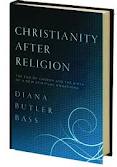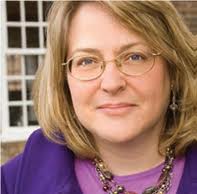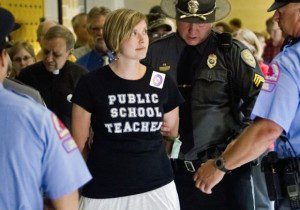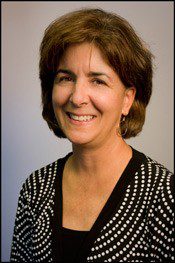 The biggest religion story this past summer was the news that the institutions of Christendom are officially dying. For those who follow such things, the data isn’t all that new. It’s been coming in, from some streams of Christendom at least, for over thirty years. If you count heads, butts, or dollars, Christianity in America doesn’t seem to be doing very well.
The biggest religion story this past summer was the news that the institutions of Christendom are officially dying. For those who follow such things, the data isn’t all that new. It’s been coming in, from some streams of Christendom at least, for over thirty years. If you count heads, butts, or dollars, Christianity in America doesn’t seem to be doing very well.
But those numbers don’t tell the whole story. Which is, in part, why The Everyday Awakening exists. Because everywhere I go, I hear stories of hope about the way people’s lives are being transformed as they dive into community with others, practicing their faith in the peculiar way of Jesus. Especially over the past few years, I’ve witnessed another Great Awakening stirring in our land—only this one’s not happening under the Big Top. It’s stirring in the thousands of local places where you and I live.
No one gets this better than Diana Butler Bass. For over a decade, she has covered renewal in Mainline churches as both a religious historian and a popular journalist. What’s more, Diana is a participant in the awakening she writes about, honestly wrestling with the good and the bad in the traditions she’s inherited and faithfully seeking a way forward not only for herself, but for a generation of spiritual seekers. Diana’s newest book, Christianity After Religion (HarperOne 2012), has already been widely celebrated. I was glad to have a chance this week to connect with Diana and talk a bit about what it has to say to those of us trying to live into the everyday awakening.
First of all, Diana, let me thank you for Christianity After Religion. It seems to me that you have your finger on the religious pulse of our culture at the moment. I wonder what sort of response you’ve gotten since the book came out. Who’s writing to say, “Yes, this is exactly what I’ve been feeling.” Who seems scared by the sort of awakening you’ve described?
 The breadth of response has been fascinating—I’ve gotten the “yes, this is exactly what I’ve been feeling” from many who refer to themselves as “emergence” Christians, mainliners who have been longing for this sort of change for more than 30 years, people who identify as spiritual-but-not-religious, neo-monastics (like yourself!) and real-in-monastary monks and nuns, Jewish rabbis and theologians, Muslim friends, folks in the Roman Catholic diaspora, liberal Baptists, peace church people (especially Quakers), and a good number of people who are part of alternative spiritual traditions. One day, I received three emails within a few hours—one from a retired Episcopal priest saying he’d been waiting for this book his whole life, another from a member of the Unification Church in Sweden who told me that he’d never read a book by a Christian where he felt so welcomed, and a third from a Jewish theologian who wanted me to speak with his rabbinical students. I’ve never written anything with such a warm range of responses. And I feel deeply grateful that I’m making new friends as a result. Indeed, the thesis is, in part, that there is a new inter-religious awakening happening all over the world. My correspondence underscores the truth of that observation.
The breadth of response has been fascinating—I’ve gotten the “yes, this is exactly what I’ve been feeling” from many who refer to themselves as “emergence” Christians, mainliners who have been longing for this sort of change for more than 30 years, people who identify as spiritual-but-not-religious, neo-monastics (like yourself!) and real-in-monastary monks and nuns, Jewish rabbis and theologians, Muslim friends, folks in the Roman Catholic diaspora, liberal Baptists, peace church people (especially Quakers), and a good number of people who are part of alternative spiritual traditions. One day, I received three emails within a few hours—one from a retired Episcopal priest saying he’d been waiting for this book his whole life, another from a member of the Unification Church in Sweden who told me that he’d never read a book by a Christian where he felt so welcomed, and a third from a Jewish theologian who wanted me to speak with his rabbinical students. I’ve never written anything with such a warm range of responses. And I feel deeply grateful that I’m making new friends as a result. Indeed, the thesis is, in part, that there is a new inter-religious awakening happening all over the world. My correspondence underscores the truth of that observation.
That said, there are nay-sayers, too. Most of the less-than-friendly notes and blogs come from folks whom I might call the “guardians of institutions.” A lot of people fear religious experience and think it dangerous, thinking that what is needed today is more religious order, a new commitment to dogma, and more institutional authority. And I have always gotten a steady stream of criticism from social, theological, and political conservatives. That has not stopped. I can’t say that they are fans of this book or the awakening I describe therein.
One of your gifts, it seems to me, is that you engage the present more than most historians while also maintaining a scholarly appreciation for all the forces at work in history, even those that animate your detractors. In other words, you have enough of a “position” that you receive the steady stream of criticism you’ve described. Yet you’re able to name how even the conservative backlash to the progressive movements of the 60s and 70s has led to our current awakening. This seems to me a deeply gospel truth: we love our enemies because we cannot be saved without them. So what have you learned from political conservatives and institutional guardians over the past 20 years? And what might we all learn from those movements today that are largely motivated by the desire to protect and defend?
I don’t think anyone has ever asked me that question before. In many cases, I’ve learned from “enemies” how NOT to behave in the world. Indeed, a dear friend, who once watched as I was struggling with an institutional crisis, said to me, “Diana, the point of this is to teach you how to be a leader. You now know how to listen because no one has listened to you; you now know how to respect others because you haven’t been respected; you now know the importance of the outsider because you have been cast out.” I hadn’t thought of that until he underscored this for me–I realized how often we take negative experiences and return evil for evil. That’s a primary problem in our political life and global relations–not to mention the life of denominations and congregations. But Christians should be able to break that cycle—and turn even the most painful experiences and worst criticism into a life of learning how to do better, how to forgive, how to love more. Understanding, listening, discernment are the basic practices in living a life of forgiveness—and when one is hurt, those practices are often blocked by fear. But the more you do them, the more habitual they become. And it becomes easier to learn from everything from mere differences of opinion to verbally violent attacks.
That’s what I’ve learned personally. As a church, I hope we can learn defensive-less-ness. Jesus was not one who was much interested in protecting or defending. Jesus was about loving and laying aside. Movements that are about “protect and defend” are far outside the Gospel narrative, outside the witness of Jesus. They aren’t Christian. We need to understand the fears that motivate such movements and the people attracted to them. But we must be equally clear that there is another way–and we must always, always, always stand as communities of conviction based in love.
Since finishing your book, I’ve described to several people the “flip” you’ve observed from a faith that believed, then practiced, then belonged to a faith that belongs, then practices, then believes. It’s a wonderfully vivid way of summing up what I’ve sensed working with young people who are drawn to Christian community. For the past few years, I’ve been trying to think about how we talk about Christian doctrine in this new setting–how it can root and ground people in their community and its practice. I wonder, are there new forms of teaching and preaching you’ve seen that seem to do this well?
Jonathan, this makes me laugh—because it always seems like we’re thinking of the same things! That is one of the most important questions that my book leaves to the imagination, mostly because we are experimenting with the “flip” as the new shape of community. I’m not entirely sure what preaching and teaching look like in their entirety, but I am sure that western, post-Christian theology needs to be a grassroots enterprise, a communal activity guided by experience as much as tradition, reason, and scripture. For insight, I often refer to the Latin American base communities of the 1970s and 1980s, as well as to African Bible study approaches as models of experiential theology and doctrinal exploration. Indeed, in the 1740s, during the First Great Awakening, John Wesley and his communities got this right in an early Industrial context—their ability to read scripture and make theology from bottom up inspired a couple generations of women and slaves toward a new, powerful expression of Christian liberation and justice. So, although the idea of starting theology in community and practice—and in the experience of transformed lives—is a bit hazy in the west right now, there are terrific examples of how to do this in non-western contexts and in the very history of the western church. I call this sort of theology the “minority report” of our traditions. Too often, experiential, awakened faith (and the theological insights it births) have been covered up or obscured by institutional control. But the “minority report” is an important dimension of Christian (and other religions as well) and is in need of recovery right now.











